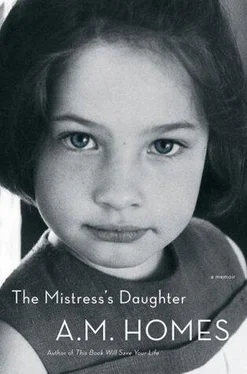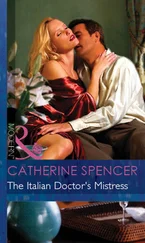I am the ghost, the one who does not exist. When I look in the mirror, do I see my reflection?
“Have you figured out how to tell them?” I ask.
“No,” he says. “I’m still having a little bit of trouble with that.” He makes it sound like something he’s trying to fix himself, a car part that requires tinkering. I have the feeling that his wife is stopping him.
He changes the subject, dividing his families. He asks if I’ve spoken with Ellen.
“She’s threatening to move to New York.”
“Yep. She said something to me about it — she’s been up there a lot lately. I think she was going back for an interview just the other day.”
Hair rises on the back of my neck — I am suddenly cold. Ellen has not mentioned that she’s actually been in the city. The fact that she’s been coming into town and not telling me is more frightening than if I knew. Has she been hanging around outside my building watching me? Has she been tracking me from a distance?
If Ellen moves to New York I will leave. I cannot be in the same place as her.
“Would you like to meet at the hotel?”
“No. I’m going back first thing in the morning.”
Norman chuckles. “I just can’t get over it,” he says. “You and your sister in the same paper, what do you make of that?”
I am thinking of Ellen moving to New York. I am thinking of his other daughter, in the same newspaper. Washington is not safe anymore. New York is not safe. No place is home. I get in my mother’s car and drive. It is pouring rain. I drive, hurling myself through space, as though I am driving toward something, as though it is an emergency. I want to see the sister, I want to know what he is so proud of. It is rush hour, the streets are filled with water. On the radio the newscaster is saying, “We’re in the middle of a torrential downpour. There are power outages, flash flood warnings.”
The paper is local, deeply local. You can only get it in a small radius around where Norman lives — which is near where I will be reading. It is like a scene from a movie. I am obsessed, there is no stopping me. I drive past broken-down cars — police are directing traffic with flares. Oblivious. I am going to meet my sister — well, not meet her, but at least see her.
When I get to the shopping center near Norman’s house, I park the car and hurry into a little card store. I pick up a stack of copies of the paper and run back to the car.
The papers are wet, the newsprint sticks together, it shreds as I pull at it, the rain stains the pages, the sides bleed and blur. I find the picture of myself — it is the publicity photo from the book, strangely formal and out of place with what is happening now. I am there looking out, oblivious to what is happening now. I scan the page. “Dress Like a Doll.” The article is about a Barbie children’s fashion show at McDonald’s. There is a photograph of Norman’s granddaughter dressed like a Barbie. Norman’s daughter, my sister, is almost invisible. She is sitting on a chair, bending over, wearing a large hat that blocks most of her face. She is wearing white pants with some sort of polka-dotted thing around her waist, a scarf belt. Is she dressed right for a nice lunch? Does she own jewelry?
I look at the picture carefully — I see her fat thigh, her belly, her feet, her outstretched hand, and it is my thigh, my belly, my feet, my hand.
There is something deeply ironic and pathetic about the whole thing. I am staring at a piece of wet newsprint trying to see what my sister, who doesn’t even know she has a sister, looks like. There is an incredible sense of disappointment. She is in a McDonald’s with her kid dressed up like a Barbie doll, and all I can think of is the short story I wrote, A Real Doll , about a boy dating a Barbie doll. I was being ironic; she is being serious. And to top it off — Norman thinks this picture of his daughter taking her kids to a fashion show at McDonald’s is equal to an article on me giving a reading from my third book. His daughter went to finishing school, had a debutante coming-out ball, and now does “interiors.” She has fat thighs, a belly, and paws for hands, but I’m sure she dresses right for lunch. It’s depressing as hell.
Drenched, I return to my parents’ house. I have ten minutes to get ready for the reading.
I go alone. Ever since the night Ellen appeared without warning at the bookstore, I am afraid of what might happen. My parents want to come, but I excuse them. I am protecting them as well as myself. The library where I’m reading is en route to Norman’s house and just down the road from Uncle George. I have no idea if Ellen has told her brother about me or if they are even speaking. I never know who knows what.
Libraries are sacred, preserved spaces where people are supposed to behave well; they are trusted places for people who love books.
I am oddly ill at ease. From the moment I arrive, I have the sense they are there — exactly who, I’m not sure — but I can tell I am being watched, sized up. There is the strange sensation that something else is going on — there are people here who have come for a reason other than to hear me read. No one approaches me, no one identifies themselves or makes themselves known in any way. It is incredibly eerie.
The librarian introduces me and I stand to read. The lights onstage are bright; I cannot see far enough into the audience to memorize every face. I wish I had guards on either side of the stage, looking out on my behalf, reading the crowd, identifying faces, reporting into their lapel pins.
I read from a work in progress. The crowd follows closely. There are book club ladies, friends from high school, fans with first editions, people who are habitués of that library, but there is something else, some unnameable force field. I am on display, I feel myself being watched, scanned, and yet I am obligated to keep reading, to pretend I don’t know this is happening. Do they think I don’t know they’re out there, that I’m oblivious to them, that they are invisible, anonymous, in the dark?
I wish I could turn the lights around, shine them into the audience, I have some questions of my own. I am tempted to pull a Lenny Bruce, stop the show, and address the mystery guests, imploring them to reveal themselves — hey, you spies from the other planet, it’s October, the least you could do is put on a Halloween costume, maybe show up looking like a skeleton or something. But it would look as if I’d lost my mind.
At the end of the reading, the librarian asks if I am willing to answer questions from the audience. “I’d be happy to.” Hands go up.
I used to believe that every question deserved an answer, I used to feel obligated to answer everything as fully and honestly as possible. I don’t anymore.
“Where do your ideas come from?” someone asks.
“From you,” I say. The crowd laughs. I look at the woman asking the question; she seems innocent enough. I continue. “I get them from looking at the world we live in, from reading the paper, watching the news. It seems as though what I write is often extreme, but in truth it happens every day.”
There are questions posed as challenges, tests. I have the sense that depending on my answer, they might say, You’re lying, I know this and that fact about you.
I point to a raised hand.
“Do you write autobiographically?”
I feel the watchers zooming in.
“No.” I say. “I have yet to write anything that is truly autobiographical.”
They are taunting me.
“Are you adopted?”
“Yes, and I’m coming up for adoption again soon, so if anyone is interested, please let the librarian at the back of the room know.” More laughter.
“Do you know who your parents are? Have you searched?”
Читать дальше












